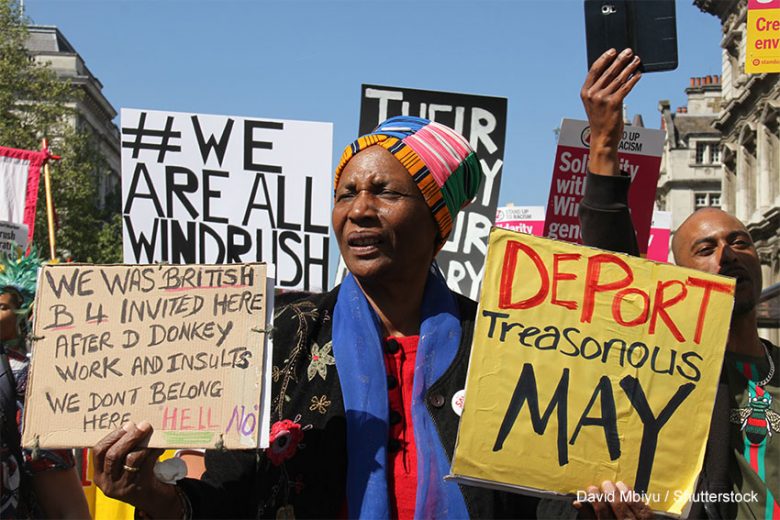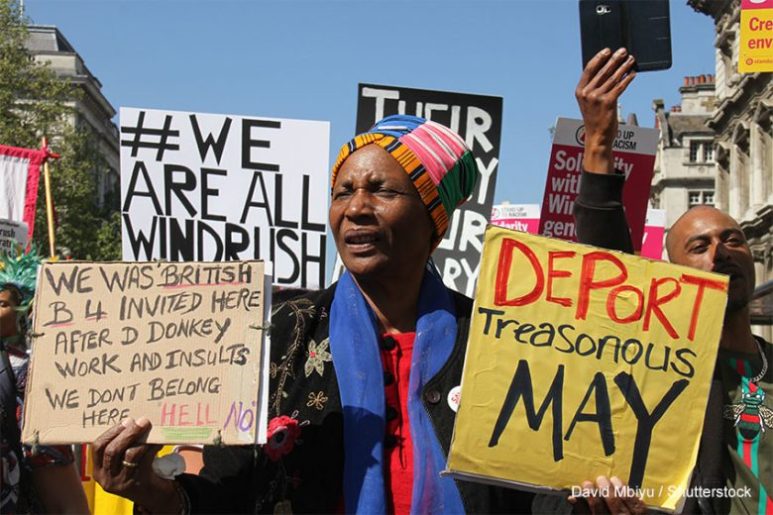By Angelo Boccato
June 22 2023 marked the 75th anniversary of the docking of the HMT Empire Windrush at Tilbury Port in Essex – the first journey carrying Caribbean families to the United Kingdom to answer the call for more workers following World War II.

Several journeys followed, with the Windrush generation becoming the first generation of British Caribbean living and working in what was still then the heart of the Empire. They contributedto building the NHS, working in public transport (after running a campaign for inclusion at the same time of the civil rights activism in the US) and to British cuisine, music, literature, art, and overall culture.
This is only part of the story:.The other part is one of a gruesome history of racism, exemplified by the famous signs that were widespread in Britain in the 1960s-70s “No Black, No Dogs, No Irish”, by the infamous speech on “rivers of blood” by Conservative MP Enoch Powell, and by the visit of Malcolm X to local Black and Asian communities brutalised by racism and discrimination in the Midlands in 1965.
However, the crucial part of this shameful story is what should be called, as activist and campaigner Patrick Vernon OBE pointed out, the “Home Office scandal”, rather than the Windrush scandal. Four years after the launch of the Windrush Compensation Scheme, many of those who could have applied have died and only a fourth of those eligible have received payments.
The Windrush anniversary is tainted by the fact that the Home Office is still a long way from owning up to its commitments, given the suffering inflicted on British Caribbeans. The celebration also falls more than a week before the celebration of the 75th anniversary of the National Health Service, which was acclaimed during the pandemic for its resilience and strength. There would not be an NHS today, without the essential contribution of thousands of the Windrush generation.
How did British media cover this 75th anniversary, given the ongoing trauma of British Caribbeans?
BBC Community Affairs Correspondent Ashitha Nagesh discussed the anniversary with several people who arrived in the UK in the 1960s, reflecting on what they experienced in their youth, as well as the racism they experienced in the workplace. One of the people Nagesh interviewed was Johnny Samuels who came in the UK in 1964, aged 8. Samuels’ story is an example of the depth of institutional racism towards Black Caribbeans in Britain. After a work-related injury in 2008, he was told that he could not claim benefits and was then threatened with deportation. He was detained three times while trying to return to the UK from trips abroad.
Sky News correspondent Shamaan Freeman-Powell pointed out that it was significant that London celebrations for Windrush Day started at Waterloo, as this was the point of arrival in the city for many British Caribbeans. She interviewed British Caribbeans on their experience, including London underground train driver Sherelle Cadagen, whose father came to England from Guyana. , Cadagen highlighted how the Equality Act, a milestone in tackling discrimination in Britain, “was driven by Caribbean people” highlighting how the West Indian communities influenced almost every aspect of life in the country.
The Guardian executive editor Hugh Muir wrote, “Their sweat and that of their descendants helped build our infrastructure – physical and social, their creativity infuses our politics, our industry, our arts, our culture, our sport. They faced challenges and today, we, their descendants face challenges and a country that still has to come to terms with its ambivalence.”
On the political front, it is also important to highlight the roles of the first Black MPs of Caribbean descent in modern British history, including Labour MPs Diane Abbot, Paul Boateng, and the late Bernie Grant. Abbot, Boateng, and Grant opened the gates for more diverse representation in the House of Commons.
The Voice gave ample coverage to the celebrations of the day and the recognition of the astonishing cultural contribution of the West Indian communities to British culture, exemplified by the unveiling of the blue plaque for the grandmaster of calypso Lord Kitchener, also known as Aldwyn Roberts, outside his former home in Manchester.
Journalist, Sociology Professor at Manchester University, and recent Orwell Prize winner Gary Younge analysed the journalistic coverage of the Home Office scandal around the Windrush generation, for the peer-reviewed journal Wasafiri, to find out how it became a nationwide scandal that caused Amber Rudd, then Home Secretary, to resign.
“The term (Windrush) renames a scandal not as a foreign story but a British one, not a story about injustice to foreigners but Britons,” Younge points out.
Director of British Future Sunder Katwala said in a piece for Hyphen that the Windrush scandal matters to British Muslims. Katwala wrote: “There have been many common and parallel experiences in the first and second generations of Britain’s minority communities: the tenacity and fortitude of the pioneers in an era of more overt discrimination, and the platforms this gave to their British-born children and grandchildren.“
As the struggle for justice continues, it becomes crucial to be vigilant and keen observers to ensure that violations of minorities’ rights in Britain do not fall under the radar in the future.

